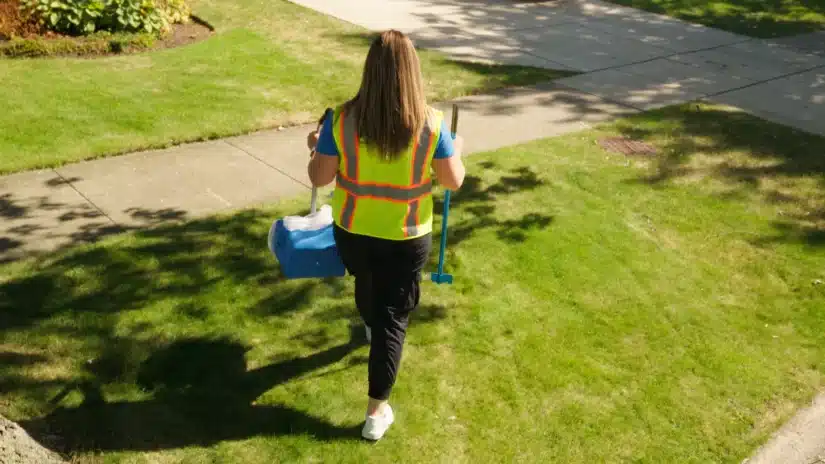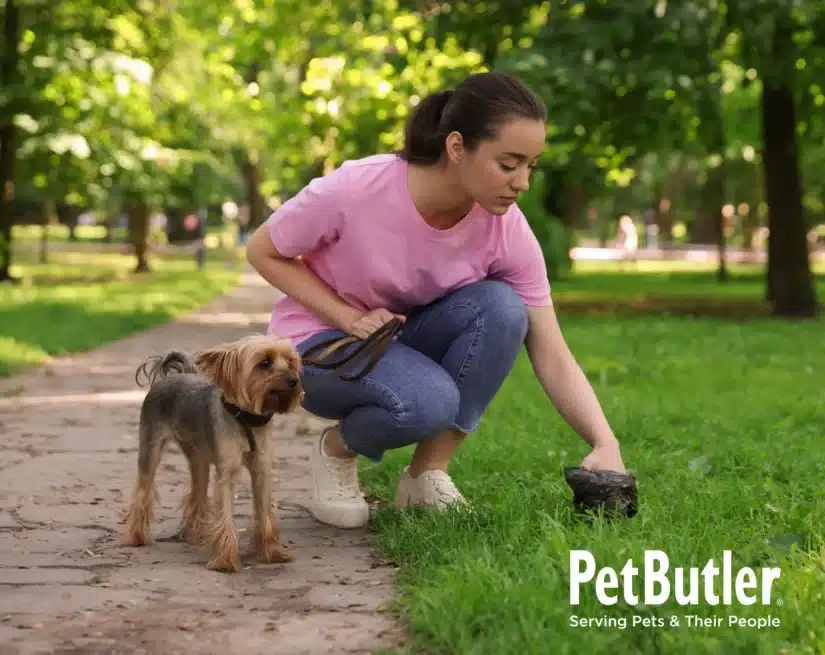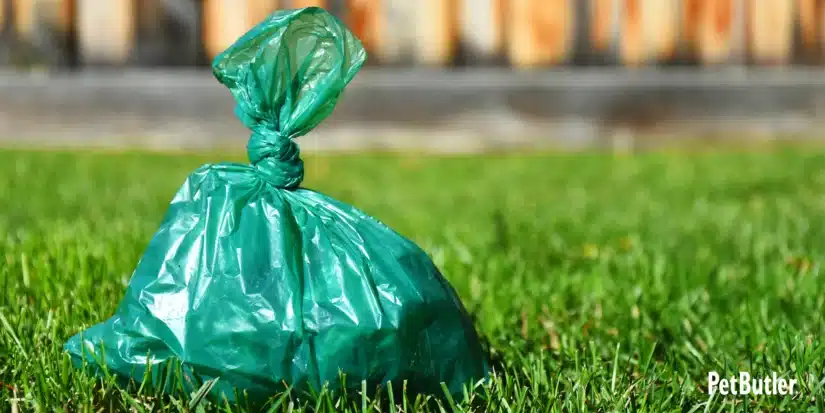Spring brings warmer temperatures, greener grass, and more time spent outdoors with your dog. But before your yard is ready for play, gatherings, or relaxation, there’s one important task to address: cleaning up the dog waste that accumulated over winter. Proper preparation ensures spring cleanup is effective, safe, and sets the stage for a healthier outdoor space all season long.
This guide walks you through why spring cleanup matters, how to prepare your yard, what to expect from a Pet Butler service, and how to keep waste from building up again.
Why Is Spring Dog Poop Cleanup Important?
Spring dog poop cleanup is especially important because winter does not eliminate dog waste—it hides it. Snow and ice can conceal poop for weeks or months, allowing bacteria and parasites to remain in the soil until thawing occurs.
Without proper preparation and cleanup, winter waste can lead to:
- Strong odors that intensify as temperatures rise.
- Exposure to bacteria such as E. coli and Salmonella.
- Parasites like roundworms and Giardia lingering in the soil.
- Increased pests including flies and rodents.
- Runoff that may carry contaminants into storm drains and waterways.
Preparing your yard ahead of time helps ensure cleanup is thorough, minimizes health risks, and restores a usable outdoor space faster.
How Long Do Dog Poop Bacteria and Parasites Survive in Your Yard?
One common misconception is that winter “takes care” of dog waste. In reality, cold temperatures don’t eliminate bacteria or parasites—they often preserve them.
Many harmful organisms found in dog poop can survive in soil for months or even years, especially when insulated by snow. As spring moisture arrives, bacteria can spread more easily across grass and into areas where people and pets walk, play, or garden.
Early spring cleanup is important. Removing waste promptly reduces prolonged exposure, limits contamination, and helps prevent health issues before outdoor activity increases.
How Do You Prepare Your Yard for Spring Dog Poop Cleanup?
Preparing your yard before cleanup is all about setting the stage for a thorough and efficient process. After winter, waste can be hidden by debris, snow piles, and overgrown areas, making it easy to miss. Taking a few simple preparation steps—like clearing obstacles, identifying problem areas, and planning ahead—helps ensure nothing is overlooked and makes the entire cleanup faster and more effective.
Step 1: Clear Debris and Remaining Snow
Remove leftover snow piles, fallen branches, leaves, and any trash that accumulated over winter so technicians can provide the best cleanup possible. These items can hide waste and slow down cleanup. In muddy areas, temporary boards or stepping stones can create safer walking paths.
Step 2: Ensure Clear Access
Please ensure clear and unobstructed access to your yard prior to service. Unlock all gates, secure or check latches, and remove any obstacles from pathways. All areas of the yard should be accessible, including spaces behind sheds, along fences, and near landscaping, to allow for a thorough and efficient service.
Step 3: Identify High-Traffic Areas
Most dogs have preferred bathroom spots. Walking through your yard and noting these areas helps ensure nothing is overlooked. Sharing this information with your technician can speed up the process.
Step 4: Consider Odor Control
As temperatures rise, odors trapped over winter can intensify. Enzyme-based odor treatments help neutralize smells at the source and refresh your lawn during spring cleanup.
Step 5: Schedule Early
Spring cleanup demand increases quickly. Scheduling your service early helps you avoid delays and ensures your yard is ready before outdoor gatherings or lawn care begins.
Step 6: Prevent Future Build-Up
Once your yard is clean, simple habits can keep it that way:
- Regular scooping based on your dog’s routine.
- Designating a potty area for easier maintenance.
- Keeping waste bags and a scooper easily accessible.
What Happens During a Professional Spring Dog Poop Cleanup?
A professional spring cleanup removes months of accumulated waste safely and efficiently. Here’s what you can expect:
- Easy Signup: Sign up online or by phone in minutes. Select service frequency, optional add-ons like odor control, and specify the number of dogs.
- Pre-Service Communication: Choose if you’d like a technician notification beforehand via text, call, or knock.
- Spring Refresh Visit: Technicians arrive in uniform with all equipment, ensuring the entire yard, lawn, patios, and pathways are cleared of waste.
- Odor Treatment: If selected, natural enzyme sprays are applied to eliminate odors at the source. This service is offered seasonally and is only available during warmer months.
- Waste Removal: All collected waste is taken off-site and disposed of properly.
- Post-Clean Inspection: Technicians verify the job is complete and leave the yard clean and ready for use.

Tips for a Smooth Spring Cleanup
- Start Early: Schedule cleanup as soon as the snow melts to prevent bacteria buildup.
- Combine with Yard Prep: Plan cleanup before lawn care or patio setup.
- Communicate Special Instructions: Let your technician know about any areas that need extra attention.
- Add Odor Control: Especially helpful during warm days when smells intensify.
The Benefits of Preparation + Professional Cleanup
- Healthier environment for pets and people.
- Reduced pests and lingering odors.
- Protection for grass and soil.
- Time-saving and peace of mind.
Final Touches: Enjoying Your Spring Yard
Once the cleanup is complete, simple finishing touches help your yard feel fully refreshed:
-
- Plant spring bulbs or seeds in waste-free soil.
- Set up outdoor furniture.
Wash pet toys and water bowls, as these can harbor bacteria if left outside during winter.
- Keep your yard guest-ready for spring gatherings and outdoor events.
With professional cleanup and smart prep, your space becomes a healthy, vibrant area for relaxation, play, and connection all season long.
Do You Need a Spring Dog Poop Cleanup Service?
You may need a spring dog poop cleanup service if winter has left your yard with hidden waste, lingering odors, or a buildup that feels overwhelming to handle on your own.
Spring cleanup is especially helpful if you’re noticing:
- A backlog of dog waste from winter walks.
- Lingering odors as temperatures rise.
- Increased outdoor activity in your yard.
Scheduling a spring cleanup with Pet Butler is a simple way to start the season with a cleaner, healthier yard.
Enjoy Your Fresh Yard
With a little preparation, your yard can go from a winter mess to a spring oasis. A clean outdoor space means more time playing fetch, relaxing in the sun, and enjoying the season without unpleasant surprises.
Call 1-800-PET-BUTLER today to schedule your first cleanup and get your yard fresh and ready for spring.



